Lesson Four: Responses to the Conditions Created by Classical Liberalism
2. Lesson Part 3.4.1: Workers and Luddites
Classical liberalism seemed not to have any advantages for the working classes. Some entrepreneurs agreed with Smith's ideas; however, many capitalists ignored Smith's basic economic principles. Many capitalists paid their workers low wages and kept much of the wealth for themselves. This prevented money from circulating as Smith had intended, which created wealthy capitalists but poor workers.
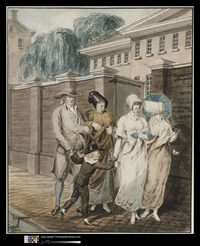
Sunday morning in Philadelphia, USA, about 1811-1813.
Contrast the surroundings, clothing, and general outlook of the upper class people in the picture above with the working class people in the picture on the right.
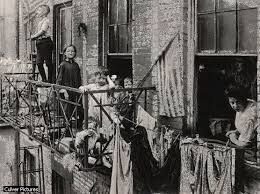
Workers in a London slum, around 1868-1872.
Contrast the surroundings, clothing, and general outlook of the working class people in the picture above with the upper class people in the picture on the left.
The Industrial Revolution began with the textile industry. The poor farmers who had lost their lands arrived from the countryside and found work in textile factories in the cities. Men, women, and children competed for jobs in the factories. Better quality cloth with brighter colours and patterns were produced at a higher quality. Large profits were being made by entrepreneurs. The situation was a dream come true for those who promoted classical liberalism. But what about the workers?
In the early days of the industrial Revolution, all work was done manually. Only a few machines were in the factories. As demand for products increased, factory owners were forced to find more productive and efficient ways to increase productivity. New machines with improved power sources (steam engines) were invented that increased productivity. They also increased unemployment because one machine was now able to complete the work that may have taken five workers to complete.
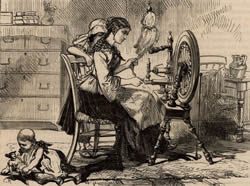
Under the domestic system, one person could spin one spool of thread at a time. It often took weeks to spin several spools of thread.
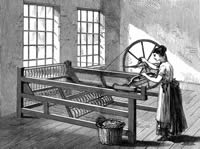
Under the factory system, one person could spin many threads at once in one day. The above machine was hand-driven. Later, much larger spinning machines were invented that were powered by steam engines.
As a result of industrialization, many people became unemployed and unable to care for their families. Some workers united and called themselves the Luddites. They opposed the new technology that replaced workers.
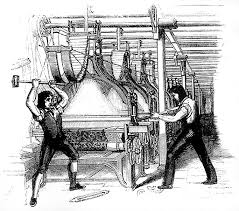
Luddites Destroying Machinery
The Luddites would break into factories and smash the machines that had replaced the workers. The Luddite movement did not last long. Factory owners and government opposed this destruction with strict laws and punishments. In addition to the Luddites, other workers threatened and even attacked inventors and businessmen for making and using machines in their factories. However, the new technology was there to stay, and the return to a pre-Industrial society was not possible.